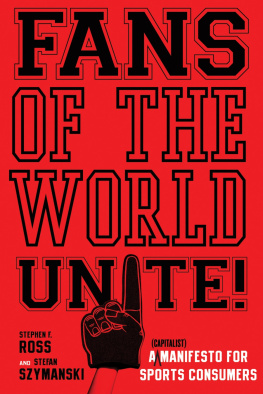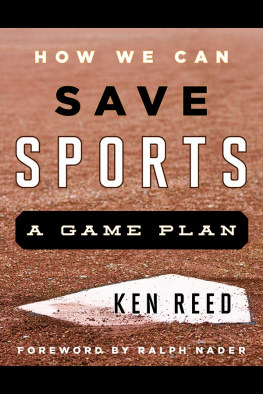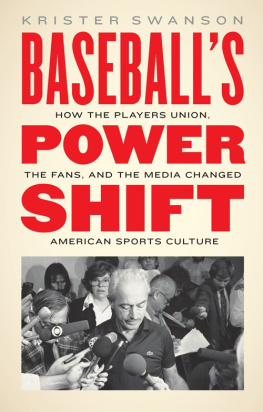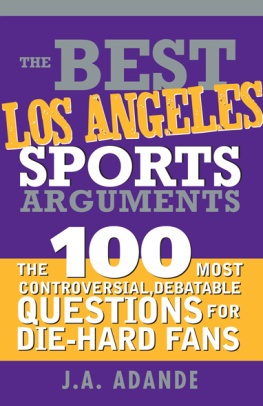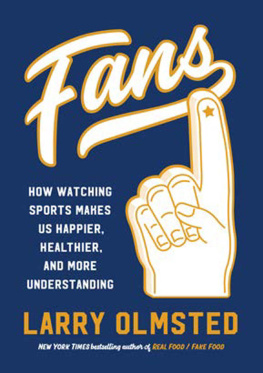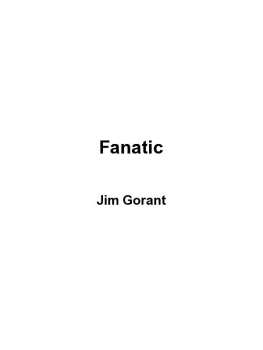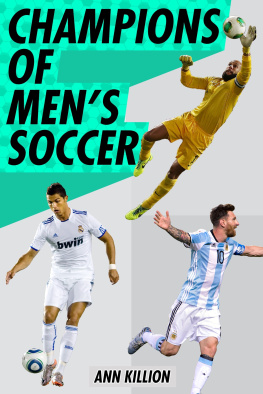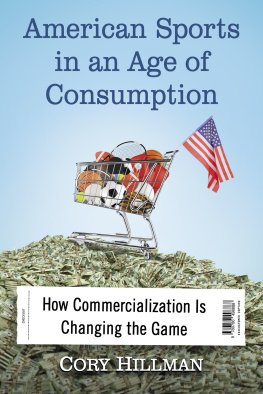Stephen F. Ross - Fans of the World, Unite!: A (Capitalist) Manifesto for Sports Consumers
Here you can read online Stephen F. Ross - Fans of the World, Unite!: A (Capitalist) Manifesto for Sports Consumers full text of the book (entire story) in english for free. Download pdf and epub, get meaning, cover and reviews about this ebook. year: 2008, publisher: Stanford Economics and Finance, genre: Politics. Description of the work, (preface) as well as reviews are available. Best literature library LitArk.com created for fans of good reading and offers a wide selection of genres:
Romance novel
Science fiction
Adventure
Detective
Science
History
Home and family
Prose
Art
Politics
Computer
Non-fiction
Religion
Business
Children
Humor
Choose a favorite category and find really read worthwhile books. Enjoy immersion in the world of imagination, feel the emotions of the characters or learn something new for yourself, make an fascinating discovery.
- Book:Fans of the World, Unite!: A (Capitalist) Manifesto for Sports Consumers
- Author:
- Publisher:Stanford Economics and Finance
- Genre:
- Year:2008
- Rating:4 / 5
- Favourites:Add to favourites
- Your mark:
- 80
- 1
- 2
- 3
- 4
- 5
Fans of the World, Unite!: A (Capitalist) Manifesto for Sports Consumers: summary, description and annotation
We offer to read an annotation, description, summary or preface (depends on what the author of the book "Fans of the World, Unite!: A (Capitalist) Manifesto for Sports Consumers" wrote himself). If you haven't found the necessary information about the book — write in the comments, we will try to find it.
Stephen F. Ross: author's other books
Who wrote Fans of the World, Unite!: A (Capitalist) Manifesto for Sports Consumers? Find out the surname, the name of the author of the book and a list of all author's works by series.
Fans of the World, Unite!: A (Capitalist) Manifesto for Sports Consumers — read online for free the complete book (whole text) full work
Below is the text of the book, divided by pages. System saving the place of the last page read, allows you to conveniently read the book "Fans of the World, Unite!: A (Capitalist) Manifesto for Sports Consumers" online for free, without having to search again every time where you left off. Put a bookmark, and you can go to the page where you finished reading at any time.
Font size:
Interval:
Bookmark:
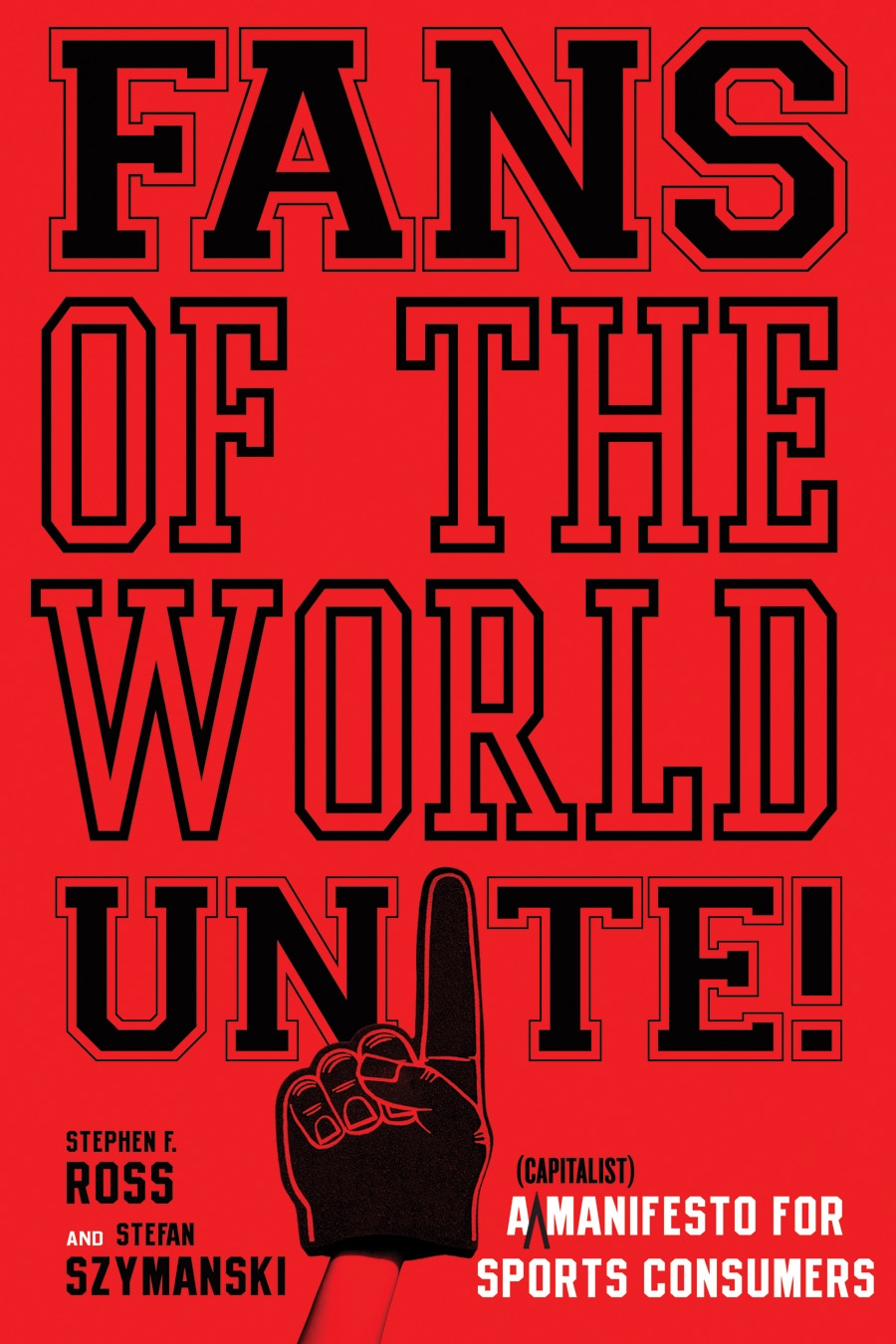
The origin of this book dates back to a conference held in October 1997 on Player Market Regulation in Professional Team Sports organized by the International Center for Sports Studies in Neuchatel, Switzerland. It was then that we discovered a shared interest in understanding how organizational structures affect sporting outcomes and the rich diversity of international sports practice. Since then we have collaborated in the analysis of organizational problems in the English Premier League (soccer) and international cricket, as well as pursuing our interests in the institutions of the U.S. major leagues, rugby union, UEFA and FIFA (the European and world governing bodies of soccer), Formula One motor racing and the International Olympic Committee, and more besides. We have also developed our thinking through several earlier published works on this topic, including Open Competition in League Sports, 2002 Wisconsin L. Rev. 625, Antitrust and Inefficient Joint Ventures: Why Sports Leagues Should Look More Like McDonalds and Less Like the United Nations, 16 Marquette Sports L. Rev. 213 (2006), and Governance and Vertical Integration in Team Sports, 25 Contemporary Economic Policy 616 (2007). This book is therefore the culmination of thought on a multitude of sporting problems, although it focuses exclusively on the problems of the U.S. majors.
Along the way we have been helped by a number of individuals and institutions, of which only the most prominent will be mentioned here. First we must thank our former universities (University of Illinois College of Law and Imperial College, Tanaka Business School) for their consistent support. In particular the College of Law funded a six-month visit by Stefan Szymanski in 2000. We also thank our current employers, Penn State and Cass Business School, for their support.
We have long benefited from the wisdom of many colleagues, and although it is invidious to be selective we must at least single out Wladimir Andreff, Dave Berri, Jeff Borland, Helmut Dietl, Rod Fort, Egon Franck, Bernd Frick, Clark Griffith, Herb Hovenkamp, Brad Humphreys, Stefan Kesenne, Kit Kinports, Robert MacDonald, Roger Noll, Ian Preston, Matt Mitten, Gary Roberts, Skip Sauer, Rob Simmons, Charles Tabb, Tommaso Valletti, Steve Weatherill, and, always last but never least, Andy Zimbalist. Over the years we have benefited from discussions with workshop participants at the University of Illinois and the annual meetings of the Sports Lawyers Association and the Western Economics Association. To those whose counsel goes unacknowledged we can only apologize.
During the writing of this book Steve Rosss brother Dave tragically passed away. He was a sharp thinker on matters sporting and Steve benefited from long hours of fruitful discussion with him on our book. He had looked forward to many more, and this is just one of many ways in which his loss will be felt by his family and friends.
We thank Margo Beth Crouppen, Jessica Walsh, John Feneron, and all the staff at Stanford for their faith in this project.
The biggest players in this game, however, have been our familiesKit, Elizabeth, and Sara Kinports and Hayley, Edward, William, and Kitty Szymanskiwho have supported us more loyally than even the most dedicated sports fans. We could not have done it without you.
Valley Liquors, Inc. v Renfield Importers, Ltd. , 678 F.2d 742, 745 (7th Cir. 1982) (Posner, J.).
Statistical tests indicate that other leagues or entertainment products do not provide serious competition for major sports. Andrew Zimbalist, In the Best Interests of Baseball? The Revolutionary Reign of Bud Selig (Hoboken, N.J.: Wiley, 2006), at 7.
Darcy v Allen , 77 Eng. Rep. 1260 (K.B. 1602).
We initially touched on this subject in Stefan Szymanski and Stephen F. Ross, Necessary Restraints and Inefficient Monopoly Sports Leagues , 1 Intl Sports L. Rev . 27 (2000), and analyzed the problem in depth in Stephen F. Ross and Stefan Szymanski, Antitrust and Inefficient Joint Ventures: Why Sports Leagues Should Look More Like McDonalds and Less Like the United Nations , 16 Marquette Sports L. Rev . 213 (2006).
NCAA v Board of Regents of the Univ. of Oklahoma & Univ. of Georgia Athletic Assn , 468 U.S. 85, 105106 (1984), discussed in Paul C. Weiler and Gary R. Roberts, Sports and the Law: Text, Cases, Problems, 3d ed. (St. Paul, Minn.: Thomson West, 2004), at 868.
See, e.g., Henry Aaron, Why Im No Fan of the Stadium Financing Plan, Washington Post , Nov. 7, 2004, at B5.
Ken Davidoff, The Nationals Pastime, Newsday , July 4, 2005, at A38.
Data on attendance, ticket prices, and much else relating to Major League Baseball and other major league sports can be obtained from the outstanding website of Professor Rodney Fort, at http://www.rodneyfort.com/SportsData/BizFrame.htm .
Paul C. Weiler, Leveling the Playing Field: How the Law Can Make Sports Better for Fans (Cambridge, Mass.: Harvard University Press, 2000), at 189.
Gregg Patton, A Guide to Super Bowl XXXIX, Press Enterprise (Riverside, Calif.), Feb. 5, 2005, at S3.
United States v Grinnell Corp. , 384 U.S. 563, 57071 (1966).
The textual narrative is based largely on Stephen F. Ross, Antitrust Options to Redress Anticompetitive Restraints and Monopolistic Practices by Sports Leagues , 52 Case Western L. J . 133, 15864 (2001).
Lionel S. Sobel, Professional Sports and the Law (New York: Law-Arts, 1977), at 17.
In Standard Oil Co. v United States , 221 U.S. 1 (1911), the Supreme Court found the defendant guilty of monopolization in violation of section 2 of the Sherman Act. Among the illegal activities engaged in by the Standard Oil Trust was the acquisition of control over numerous rival oil refineries and the elimination of other rivals by foreclosing their access to transportation and distribution facilities.
United States v Aluminum Co. of America , 148 F.2d 416 (2d Cir. 1945).
Federal Baseball Club v National League , 259 U.S. 200 (1922) initially held that the business of baseball was not interstate commerce, and thus not subject to the Sherman Act. Flood v Kuhn , 407 U.S. 258 (1972) acknowledged that modern definitions of commerce included the business of baseball, but that Congresss positive inaction in leaving the Federal Baseball precedent untouched, combined with a consideration of baseballs unique characteristics and needs, justified continuation of the judicially created exemption. Whether the Supreme Court would or should reaffirm Flood today remains an open question. See Major League Baseball v Crist , 331 F.3d 1177 (11th Cir. 2003) (finding that lower appellate court could not distinguish or overrule Flood but that death of the business-of-baseball exemption would likely be met with considerable fanfare, save for the club owners who benefit from the rule).
David Harris, The League (New York: Bantam, 1986), at 17.
United States Football League v National Football League , 842 F.2d 1335 (2d Cir. 1988).
Ross, Antitrust Options , at 164.
Ibid. at 157 n.70.
Baseball Antitrust Immunity: Hearing Before the Subcomm. on Antitrust, Monopolies and Business Rights, Senate Comm. on the Judiciary, 102d Cong., 2d Sess. 33 (Serial No. J-102-90) (1992).
See, e.g., John Kass and Daniel Egler, Sox Will Stay If Legislature OKs Proposal, Chicago Tribune , May 12, 1988, part 1, at 1; Giants OK Deal to LeaveLeague to Vote on Sale to Florida Group, San Francisco Chronicle, Aug. 8, 1992, at A1 (the San Francisco Giants owner, disenchanted with the current stadium and voter refusal to subsidize a new one, shops team around to any buyer with no regard for keeping the team in the area); Stefan Fatsis, Seven Strikes and Still Swinging: St. Petersburg Still Hopes to Get a Major-League Team, Cleveland Plain-Dealer , July 14, 1993, at 5F (detailing the emergence of local buyers to prevent relocation to Tampa of teams in Oakland, Minnesota, and Dallas-Fort Worth). Tax subsidies and favorable stadium deals have replaced local media revenues as the most important factor in franchise value and profitability, allowing midsize market clubs such as the Texas Rangers, Baltimore Orioles, and Cleveland Indians to earn above-average incomes. See Michael K. Oznian and Brooke Grabarek, Foul! Financial World, Sept. 1, 1994, at 1820. Of course, baseballs commissioner, former Milwaukee Brewers owner Bud Selig, would never threaten to move to Tampa for such exploitive purposes. Rather, if sufficient tax subsidies were not forthcoming in Wisconsin for the Brewers, Selig threatened to move to Phoenix or Charlotte! See Andrew Zimbalist, Baseball Economics and Antitrust Immunity , 4 Seton Hall J. Sport L. 297, 303 (1994).
Font size:
Interval:
Bookmark:
Similar books «Fans of the World, Unite!: A (Capitalist) Manifesto for Sports Consumers»
Look at similar books to Fans of the World, Unite!: A (Capitalist) Manifesto for Sports Consumers. We have selected literature similar in name and meaning in the hope of providing readers with more options to find new, interesting, not yet read works.
Discussion, reviews of the book Fans of the World, Unite!: A (Capitalist) Manifesto for Sports Consumers and just readers' own opinions. Leave your comments, write what you think about the work, its meaning or the main characters. Specify what exactly you liked and what you didn't like, and why you think so.

